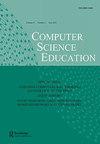学生如何发展计算思维?在基于迷宫的在线游戏中评估早期程序员
IF 2.2
Q1 EDUCATION & EDUCATIONAL RESEARCH
引用次数: 16
摘要
摘要背景和背景:尽管有许多开发计算思维(CT)的举措,但对早期程序员如何开发CT以及我们如何评估他们的学习情况知之甚少。目标:确定对学生与在线平台互动的分析是否有助于理解CT的发展,我们如何将收集的数据转化为有价值的见解,以及平台设计中应考虑的方面。方法:我们开发了一个具有细粒度日志记录系统的在线平台。我们分析了1004名学生(8-14岁)的数据,以了解他们面临的困难。我们解释了我们的平台以及处理和过滤交互日志的工具。我们计算了额外的指标,这些指标提供了有关学生行为的有用信息。研究结果:年龄和性别对CT学习有影响。从基本交互数据生成额外的指标提供了有价值的见解。我们为开发更有效的编程学习平台提供了一系列建议。本文章由计算机程序翻译,如有差异,请以英文原文为准。
How do students develop computational thinking? Assessing early programmers in a maze-based online game
ABSTRACT Background and Context: Despite many initiatives to develop Computational Thinking (CT), not much is known about how early programmers develop CT and how we can assess their learning. Objective: Determine if the analysis of students’ interactions with an online platform allows understanding the development of CT, how we can convert data collected into valuable insights, and the aspects that should be considered in platforms design. Method: We developed an online platform with a fine-grained log–recording system. We analysed the data collected from 1004 students (ages 8-14) to understand the difficulties they face. We explain our platform and the tools to process and filter the interaction logs. We calculate additional indicators that provide useful information about student’s behaviour. Findings: Age and gender have shown to influence on CT learning. Generating additional indicators from basic interaction data provide valuable insights. We provide a list of recommendations for developing more effective programming learning platforms.
求助全文
通过发布文献求助,成功后即可免费获取论文全文。
去求助
来源期刊

Computer Science Education
EDUCATION & EDUCATIONAL RESEARCH-
CiteScore
6.90
自引率
3.70%
发文量
23
期刊介绍:
Computer Science Education publishes high-quality papers with a specific focus on teaching and learning within the computing discipline. The journal seeks novel contributions that are accessible and of interest to researchers and practitioners alike. We invite work with learners of all ages and across both classroom and out-of-classroom learning contexts.
 求助内容:
求助内容: 应助结果提醒方式:
应助结果提醒方式:


